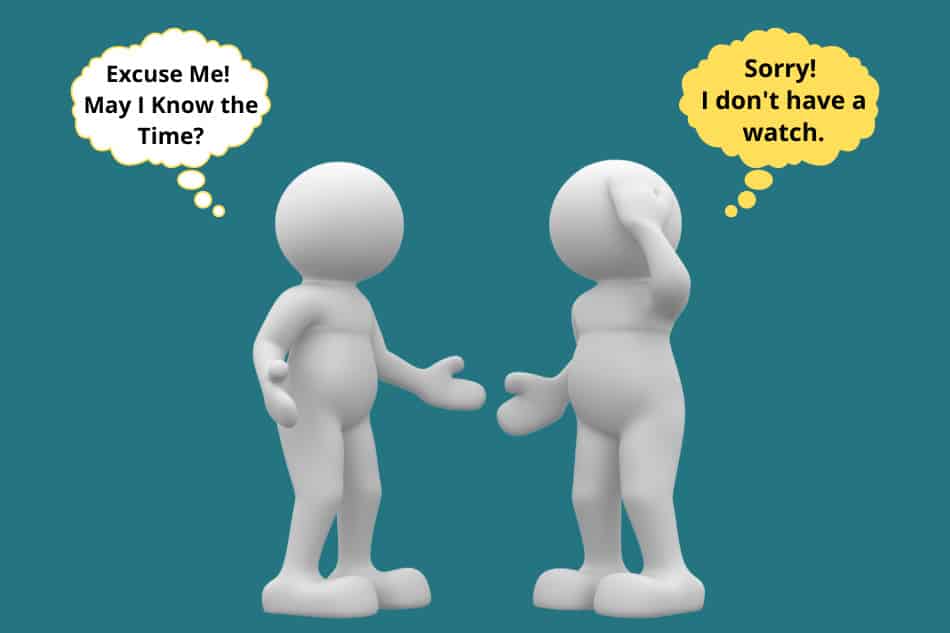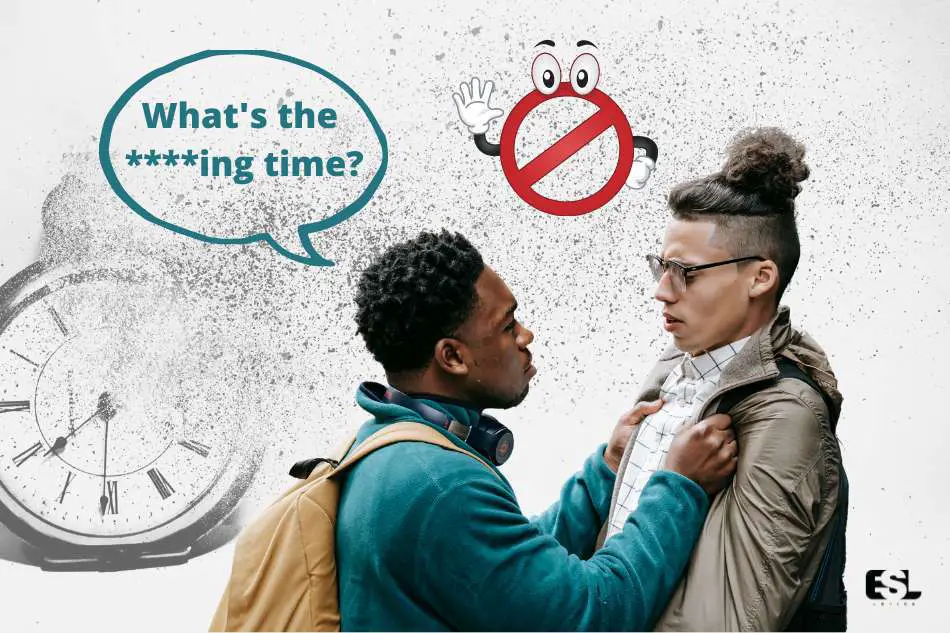This article covers the following areas –
- What time is it?
- Could you please tell me the time?
- Excuse me, may I know the time?
- Would you please tell me what time it is now?
- Would you mind if I asked you the time?
- What time does/should…?
- How long…?
- Use a Polite Tone & Appropriate Gesture While Asking the Time
- Sample Conversation: Asking the Time in English
- Final Note
- FAQ: Asking the Time in English
Whoever you talk to or wherever you are, time is a constant feature of your life. From a corporate to a social gathering, time remains a significant factor. You need to ask people about the time of a meeting, seminar, conference, class, cricket match, party, or when you forget to wear your wristwatch and need to know the exact time. How to do that?
“Could you please tell me the time?” and “What time is it?” are commonly used to ask the time in English. Also, there are some other polite expressions that native speakers of English use to ask the time depending on situations and purposes. No matter whom you talk to, you are expected to have polite diction, tone, and gesture while asking the time.
For many non-native speakers, asking the time in English may seem very difficult. Worry not! In this post, I have come up with some simple and polite expressions so that you can sound smart and natural while asking the time in English.
Note: Don’t get confused between “Asking the time” and “Asking for time.” When you ask the time, you want to know (1) what time it is now, (2) when something will happen, or (3) how long it will take. On the other hand, if you ask for time from someone, you want to know if they are free or available at your requested time.
Throughout the post, I will explain different expressions in detail and show how we can use them in different situations for various purposes.
To learn different ways to ask someone about their availability, read my another post titled How to Ask If Someone Is Available.
Are you looking for a book or a guide to help you learn and improve your English? You may try English Made Easy Volume One: A New ESL Approach: Learning English Through Pictures (Amazon Link).
What time is it?
“What time is it?” is probably the most popular way of asking someone about the time. On different occasions, when you need to know the time, you can simply use this expression to ask someone about the time. I recommend using this only for informal situations.
Suppose you are at the birthday party of one of your close friends and it seems too late at night. You don’t have any watch or clock nearby. How do you know the time then? Of course, you ask someone else about the time by saying, “What time is it?” There are some other similar expressions too. You can say—
- What is the time?
- What time is it now?
- What’s the time by your watch?
Could you please tell me the time?
You might think this particular expression would be a very formal way of asking someone about the time as you see the words “Could” and “Please” in the expression. Yes, of course, while you make any request, using modal auxiliary verbs at the beginning and adding the word “please” may help you sound formal and polite.
Well! To know how modal auxiliary can help you make your requests more polite and formal, you can read my other post—Making Polite Requests: Formal, Informal, and Semi-formal.
Whenever you ask someone the time, you request them to help you with the time information by their watch. So, in any situation, whether it’s formal or informal, you can ask the time by saying, “Could you please tell me the time?”
You can also use this expression to the people you know or have met for the first time. Suppose you left your mobile phone home in a hurry. You are waiting at a bus stop, and you need to know the time as you have a meeting to join. You can ask the person you met for the first time standing next to you about the time by saying, “Could you please tell me the time?”
Note: You can replace the modal “Could” with “Would” in this expression. It will sound like “Would You Please Tell Me the Time?” then.
Excuse me, may I know the time?

“Excuse me, may I know the time” is similar to the expression “Could you please tell me the time?” In both the expressions, we notice modal verbs and polite words like “Please” and “Excuse me.”
We can use “Excuse me, may I know the time?” to ask about the time in formal situations. Whether someone is already known or unknown, you can ask them about the time using this polite expression.
Would you please tell me what time it is now?
This is a very formal way to ask someone about the time. We already have come to know that “What time is it?” is the most common but casual way of asking someone about the time. “Would you tell me what time it is now, please?” also have a similar meaning with a similar purpose to the expression “What time is it?”
However, there is a difference in terms of formality and politeness. We use “Would you tell me what time it is now, please?” in formal settings, but we use “What time is it?” in informal settings.
Note: The modal auxiliary “Would” can be replaced with “Could” in this particular expression. In that case, it sounds like “Could You Please Tell Me the Time?” then.
Would you mind if I asked you the time?
Though this expression sounds like a question, this is used to ask for permission and make requests. However, “Would you mind…” is prevalently used to ask for permission politely in English. We can use this to ask about the time as well.
Though it sounds like asking for permission, the person you ask the time from is expected to reply with something like, “It’s five o’clock.” You can use this expression in formal situations and with the people you already know or someone you have met right now.
Note: The word “Would” is replaceable with “Do” in this expression. After the replacement, it will sound like, “Do you mind if I ask you the time?” Yet, I recommend using the expression with “Do” in informal or semi-formal settings.
What time does/should…?
I already have mentioned that different expressions are used to ask the time based on situations and purposes. Suppose you are talking to a customer care agent of a super shop to know about the shop’s opening time. What do you ask the agent? You say—What time does the shop open?
Like the other ways of asking about the time, this particular expression also aims at finding time-specific information. Some similar kinds of questions may be—
- What time does your shop close?
- What time does the movie end?
- What time should they leave?
- What time should we come?
Note: In most cases, the phrase “What time” can be replaced with “When” in this expression. The sentences will sound like—
- When does the shop close?
- When does the movie end?
- When should they leave?
- When should we come?
How long…?
The purpose of asking about the time is not limited to knowing about the present clock time but also to know when something may happen or how long it may take. Well! How do we ask if we want to know the time frame or duration of any action that has already occurred or will take place?
We use the phrase “How long” at the beginning of the sentence to know about the duration of any action. Let’s see some examples that show how to ask about the time of any activity that has already taken place.
- How long did it take to copy the files?
- How long have you been there?
- How long have you studied English literature?
Similarly, when we need to ask about the time frame of any action that may take place in the future or happen regularly, we say—
Use a Polite Tone & Appropriate Gesture While Asking the Time

Our voice tone and body language can play a vital role in making it more effective during verbal communication. Though your tone and gesture are nonverbal communication tools, they can add beauty to your verbal communication. While asking the time from someone, you are expected to be polite in your choice of words, tone, and body language.
When you ask the time, you request a specific piece of information from someone. And, of course, your tone and body language matter a lot while making any request. Your attitude can be crucial in convincing the person to accept your request. In another post, I talked about effective and polite body language while making requests or asking for permission.
Sample Conversation: Asking the Time in English
Bryan: Excuse me. May I ask what time is it?
Torry: It’s fifteen past three.
Bryan: Oh, thanks…. Hi, I’m Bryan by the way.
Torry: I’m Torry. Nice to meet you.
Bryan: Nice to meet you too. Are you in the Psychology department too? I think I saw you in the class.
Torry: Yep. I saw you too. Are you working on the Criminal Psychology assignment?
Bryan: Yeah. I’ve still loads to write. What are you doing?
Torry: I’m on the research part still. How long do you think it will take you to finish?
Bryan: Can’t say anything right now. I might need a day or two. And you?
Torry: More than what you need. I have to print some infographics and charts before I start writing. Do you know when does the business service center close?
Bryan: Just about time…. In fifteen minutes maybe.
Torry: Seriously! Then I guess I’ve got to dash now — see ya later, Bryan.
Bryan: Yeah, I’ll see ya around.
Final Note
Asking the time in the right way is essential to all speakers, regardless of their language. As an ESL teacher, I find many of my students struggling with the expressions of asking the time.
I hope this post will help you to overcome the problems related to this.
Thanks for reading.
Happy learning.
FAQ: Asking the Time in English
1. Why is it essential to know how to ask for the time correctly in English?
Being able to inquire about the time is a basic and frequent necessity, whether for punctuality, scheduling, or daily activities.
2. What are common phrases to ask for the time?
Common phrases include “What time is it?”, “Do you have the time?”, “Could you tell me the time, please?” and “Can you check the time for me?”
3. How can tone influence the way I ask for the time?
A polite and neutral tone ensures the request is courteous and non-intrusive.
4. Is it appropriate to ask strangers for the time?
Yes, it’s generally acceptable to ask strangers for the time, especially if you approach them politely.
5. How can I respond if someone asks me for the time and I don’t have a watch or phone?
You can reply with something like, “I’m sorry, I don’t have a watch on me right now,” or “I’m not sure, but there might be a clock nearby.”
6. Are there cultural nuances in asking for the time?
While asking for the time is a universal concept, the phrasing or formality might vary slightly across cultures. However, the general approach remains similar.
7. How can I teach children to ask for the time?
Using role-playing exercises, showing them various clocks and watches, and practicing in real-life scenarios can help children learn to ask for the time.
8. Is there a difference between asking for the time in formal and informal settings?
In formal settings, you might use more polite phrasing like “Could you please tell me the current time?” In informal contexts, a simple “What time is it?” is usually sufficient.
9. How can I specify if I want to know the time in a different time zone?
You can ask, “Do you know what time it is in London right now?” or “Can you tell me the current time in the Pacific Time Zone?”
10. Is it important to specify AM or PM when telling the time?
In a 12-hour clock format, specifying AM or PM is crucial to distinguish between morning and evening. However, in a 24-hour format or military time, it’s not necessary.






